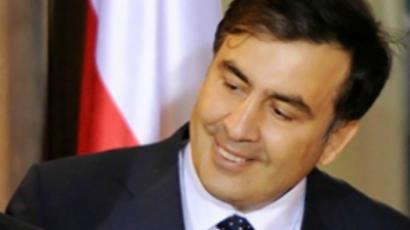No amnesty for Georgia’s political prisoners
Georgia's opposition is trying to draw attention to the growing number of political prisoners in the country.
Georgian demonstrators are rallying in Moscow because this is something they feel they cannot do in their own country. They’re demanding the freedom of a man they believe is being held in a Georgian prison on trumped-up charges.
Dr Vladimir Vakhaniya has been in custody for more than a year, but his supporters say his only crime was asking for a cassette tape from a journalist, which she had used to interview him.
“Afterwards, more than 200 commandos staged a search in his house just to find that tiny cassette. And you know what they found? Naturally they found weapons, AK-47s and hand grenades,” sneers Temuri Vakhaniya, Vakhaniya’s brother. “My brother is a doctor of science and a professor. He’s written more than twelve books, and all of a sudden he grabs hold of arms that, moreover, he keeps under his mattress. Unfortunately Georgia metes out these kinds of absurd and false accusations quite often.”
Temuri has no doubt the weapons were planted. He believes the authorities want his brother because he’s a popular political figure. Dr Vakhaniya was arrested while trying to fly to Moscow from Tbilisi and had his Russian passport confiscated.
Lawyers say they’re trying to prove that the accusations against him are false. But they’re not confident they’ll get a fair trial.
Shefia Djemal, vice-president of Advocates Society in Georgia, is sure that the evidence was fabricated, and he believes there will be pressure from the prosecutor and Vakhaniya will most likely be convicted.
“He was accused on the eleventh of March. This was the day he was supposed to officially declare his political party and that’s why the government was in a rush to stop him,” Djemal says. “But because they were in a rush, they made a lot of stupid mistakes. If he’d been a politician it would be a good case of political oppression.”
But human rights activists say there are already dozens of political prisoners in Georgia today. One of those activists says Vakhaniya’s case is all too common.
“There’s new Georgian legislation that introduces some limitations on freedom of speech and expression. This makes it more difficult to speak out against the government,” says David Managadze, a lawyer from Human Rights Centre.
He insists that “People are being persecuted for their political viewpoints and their social and public opinions. Even their relatives are being targeted.”
But Vakhaniya’s relatives refuse to keep quiet. They’ve taken their protest to the international stage and want people in the U.S. and Europe to know about it.
Vakhaniya’s son has written an open letter, published on the front pages of the Georgian Times, to the president of Switzerland. In it, he asks that the international community become more involved in a case that has all the markings of government interference.
“It’s regrettable, but these things are happening pretty often in Georgia today. Democracy, after all, is not about haranguing TV audiences in the US about being a democratic country,” Temuri Vakhaniya says.
Dr Vakhaniya’s brother believes that “Democracy is about people living freely, being able to speak their mind, being able to air their political views. Regrettably, Georgia cannot boast anything of the kind.”













